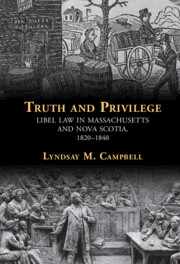‘A fascinating comparison of two sister polities with shared legal inheritances, separated by a revolution. Campbell's brilliant study tells a marvellous tale of how Nova Scotia and Massachusetts each struggled to define freedom of expression through law while debates over temperance, religion, science, sexual morality, patriarchy, abolition, and governance swirled around them.'
Constance Backhouse - Professor of Law, University of Ottawa
‘In a fascinating comparative account of diverging constitutional systems, Professor Campbell deftly disentangles the unfamiliar roots of modern debates about free expression, ‘truth,' and the public order.'
Mary Sarah Bilder - Founders Professor, Boston College Law School
‘Based on extensive research in case law, Lyndsay Campbell provides fascinating insights into the ways in which the evolving law of libel in Nova Scotia and Massachusetts reflected significant differences between societies that were similar in many respects. Her title points to a major contrast. The emphasis on the defense of truth in Massachusetts derived from commitments to individualism, whereas the focus on claims of privilege in Nova Scotia highlighted the role of institutions in protecting speech.'
David M. Rabban - University of Texas School of Law
‘This is a rich and wide-ranging comparative study of the law of libel and defamation at a formative time in American and Canadian legal history, but much more besides. Campbell bridges borders - Canada and the USA but also between criminal and civil libel, elites and more ordinary people - to offer a fascinating look at how legal debates over expression shaped vital broader issues like constitutional ordering, abolitionism, religious dissent, obscenity, and privacy.'
Eric H. Reiter - Concordia University, Montreal
‘This book will be of interest to any historian seeking to better understand free speech, law, society and power in Nova Scotia and Massachusetts in the early nineteenth century.’
Kristin A. Olbertson
Source: Comparative Legal History



